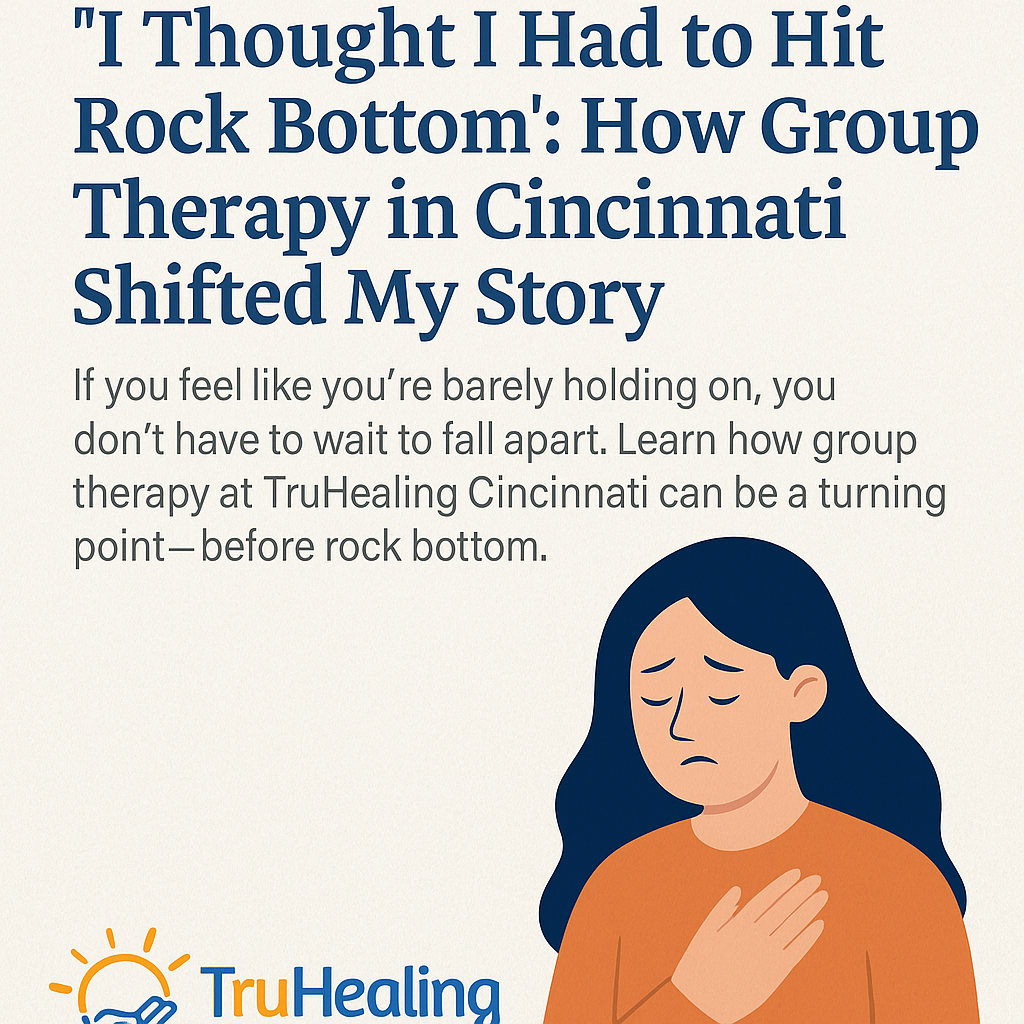Sometimes, it isn’t a crisis. It’s just a day where getting out of bed feels like a dare. Where you float through the hours, not wanting to die—but not wanting to be alive like this either. And beneath all of that, a dangerous belief hums: I haven’t suffered enough to ask for help.
That’s the lie IOP helped me unlearn.
Rock Bottom Isn’t a Prerequisite for Getting Help
I used to think I had to fall apart to qualify for support. That unless I had a suicide attempt or was found sobbing on the bathroom floor, people would think I was faking it—or worse, wasting their time. So I kept going. Working. Smiling. Nodding when people asked how I was.
But inside, I was watching the world blur. Not from drugs or alcohol—but from a slow leak of meaning. I wasn’t living. I was managing. Barely.
When I finally called TruHealing Cincinnati, I half-expected them to say I wasn’t “bad enough” for treatment. Instead, I was met with calm. Kindness. A question I didn’t expect: “What would it mean for you to feel okay again?”
That was the first time I realized I didn’t have to collapse before I could be seen.
What Group Therapy Gave Me That Isolation Never Could
Group therapy sounded terrifying at first. Sit in a circle and tell strangers my darkest thoughts? No thanks.
But the thing about carrying invisible pain is that it convinces you you’re the only one. That you’re too sensitive. Too broken. Too much.
In IOP, I met people who finished my sentences before I could find the words. People who weren’t shocked by my sadness. People who admitted they’d thought the same things, too—“What if it would be easier if I just… stopped existing?”
And instead of recoiling, the group leaned in. That changed everything.
We laughed sometimes, cried other times, and mostly just told the truth. Not all of it. Just the part we could. And that was enough to start.
You Don’t Have to Know the Ending to Start the Chapter
One of the most paralyzing parts of suicidal ideation is not knowing what comes next. If you’re not going to end things, then what? Just… more of this?
That uncertainty almost kept me from reaching out. I didn’t have a plan for recovery. I didn’t know how to fix myself. I just knew I couldn’t keep doing this alone.
IOP didn’t ask me for answers. It offered a structure when I had none. It provided stability while I learned to believe in mornings again.
Some days, showing up was all I could do. But showing up was the work.

Healing in Community: Why Group Therapy Works
There’s something strangely holy about being in a room with people who get it. Not in theory, but in their bones.
In group therapy, someone always speaks the thing you didn’t know you needed to hear. Like the woman who once said, “I don’t want to die, I just want to rest without guilt.” That hit something deep in me.
Group therapy works because it helps you speak the unspeakable—and realize you’re not alone in it. It builds emotional muscle you didn’t know you had. It chips away at shame until you can finally say, “Me too,” out loud.
At TruHealing Cincinnati’s group therapy program, I found a space that held me gently while I figured out how to stay. Not for anyone else. For me.
You Don’t Need to Be in Crisis to Be in Care
One of the myths that kept me quiet was this: You have to be in crisis to deserve treatment. But the truth is, emotional pain doesn’t have to be loud to be valid. Numbness counts. Exhaustion counts. Wanting out counts—even if you’re not taking steps to make it happen.
If your inner world feels like a constant ache, that’s enough reason to seek help.
At TruHealing Cincinnati, IOP isn’t just for those falling apart. It’s for those trying to hold it together when they don’t know how much longer they can.
Cincinnati Gave Me More Than Care—It Gave Me Connection
The city you live in can shape your healing. For me, staying close to home in Cincinnati meant I didn’t have to uproot everything. I could go to group during the day and still sleep in my own bed. If you’re local to Lexington, Kentucky or Springfield, Ohio, TruHealing offers help that meets you exactly where you are.
It also meant I could start building a support system right here. Real people. Local connections. Familiar streets that began to feel less lonely.
Group therapy gave me a new relationship to my city—and to myself.
You’re Allowed to Stay—Even If It Still Hurts
Some days, I still don’t have all the answers. But I’m here. And I’m glad I stayed long enough to find out what else could be true.
If you’re hovering in that hard place—too tired to keep going, but too alive to let go—there’s help. There’s care. There’s a version of you waiting on the other side of this chapter.
And you don’t have to hit rock bottom to meet them.
FAQ: Group Therapy and Suicidal Thoughts
Is group therapy right for me if I’m feeling suicidal?
Yes—especially if you’re having passive suicidal thoughts (like wishing you didn’t exist) but aren’t in immediate crisis. Group therapy offers support, structure, and connection in a way that one-on-one therapy sometimes can’t match. You’re not alone—and you don’t have to figure it out alone either.
What happens if I say something heavy in group?
You won’t be judged or punished for your honesty. Facilitators are trained to hold space for difficult emotions safely. And chances are, someone else in the room will understand exactly what you mean—even if you can’t say it perfectly.
How do I join group therapy in Cincinnati?
You can call TruHealing Cincinnati directly at (888) 643-9118. Our team will walk you through a brief assessment to see if group therapy or another level of care is the right fit. You can also learn more at our group therapy page.
What if I’m scared to open up?
That’s okay. Most people are. Group therapy meets you where you are. You don’t have to share everything to begin healing. Just being there is enough to start.
📞 Ready to take the first step?
Call (888) 643-9118 or visit to learn more about our group therapy services in Cincinnati, Ohio. You don’t have to hit rock bottom. You just have to be ready for something different.

